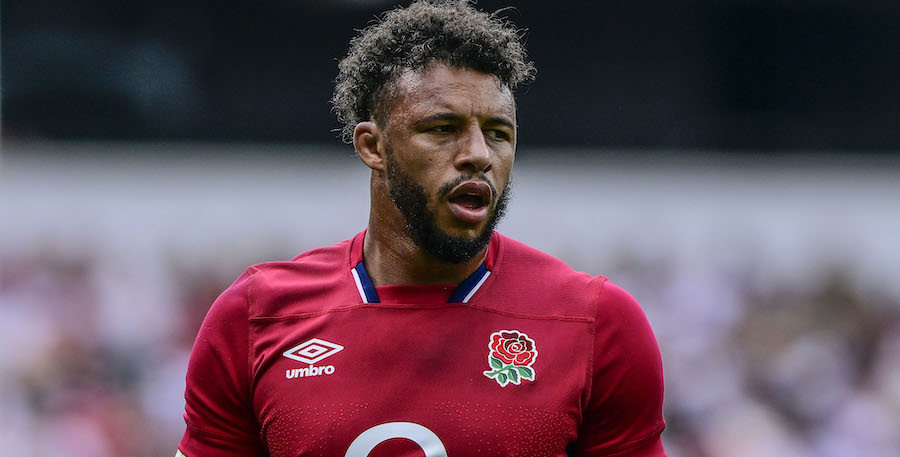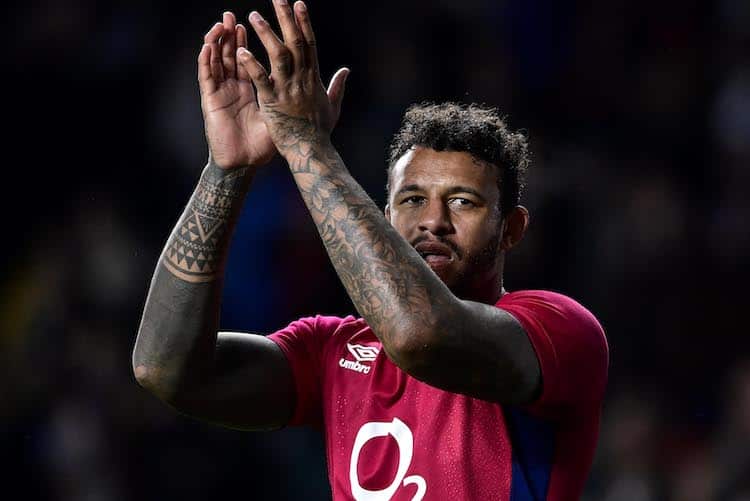Former England captain Dylan Hartley, has spoken about his former position that is amongst the most heavily scrutinised roles throughout international rugby. Hartley took up the armband for England in 2016, when he took over from Chris Robshaw in the beginning of the Eddie Jones era.
Hartley’s two-year run as England captain was a rather successful run, as his side won the Grand Slam in his first campaign as captain. The hooker would then lead England to first ever away series win against Australia that Summer, and a second consecutive Six Nations title the following year. Hartley capped this off by leading England to a record-equalling run of 18 consecutive test match victories, and became the countries most-capped hooker.

Hartley stepped away from the international circuit in 2018, and passed the number two jersey to Jamie George. The Saracen had established himself upon the test match stage, since making his England debut in 2015 and being Hartley’s understudy throughout the victorious Six Nations campaigns that followed. George now holds up the mantle as England captain, as head coach Steve Borthwick bestowed him the honour after Owen Farrell’s stepped down from international duties.
George is two wins from two in his time at the reins, following Six Nations victories against Italy and Wales. Hartley discussed the challenges that George has likely faced since stepping up to the role, and the imperative differences from captaining at club level in comparison to the international stage. Speaking to Gambling Zone, Hartley said;

“There’s a different level of scrutiny when you captain your country versus captaining your club side. There is a greater expectation captaining England, whereas when you captain your club, you have more time to rectify certain elements of the role over a longer period when compared to tournament rugby.
“As a club captain, you can learn and mature. You’re allowed to lose. When you’re the captain at an international level, you get one shot. You’ve got five games in a row at the Six Nations then you have four games in a row for the autumn. You have three tests in a row in the summer and you have to get it right from the off.

I” think the biggest challenge of being an international captain is getting everyone on the same page before the matches start. That will have been the biggest challenge for Jamie George. Ten days out from playing Italy in the opening match of the Six Nations, he has to be the glue that bonds together a squad of forty guys and, it’s a bit like the first day of school in many ways. There are new relationships to build and new players to get to know who are experiencing that international environment for the first time.
“You then have to deal with the new standards that the coach Steve Borthwick wants to set and bed in his philosophy and culture. Getting forty people to be completely aligned in such a short space of time, when you only really train once or twice a day for an hour, it gives you limited time to bond with your team mates.

“Club rugby is completely different. It takes years for a successful team to come together whereas with international rugby, you have to get it right straight away. You have all the challenges off the field, but you also have to lead by example on the field and deliver.
“99% of a captain’s job is unseen. The majority of captaining for me is what they do from Monday to Friday to get the team ready. That is where you earn your bread as a captain.”

Another former England captain had been in the news as of late, as Courtney Lawes led a few outings as skipper ahead of his international retirement post-Rugby World Cup. Lawes captained England in the Summer Nations Series ahead of the trip to France, with his last appearence at the helm coming in the Twickenham defeat to Fiji.
Lawes recently stated how rugby needs to be ‘unapologetic’ in it’s physicality in order to grow as a game, which received a mixed reaction from the supporters. Hartley was impressed by Lawes’ comments, and believes that the Northampton lock echoed what he had been saying for a number of years.

“I loved Courtney’s comments about rugby being unapologetically physical. I’ve been saying this all along, we need to stop apologising. You can’t change the game; the game is gladiatorial. The foundations of the game and what’s celebrated about it is that physicality. People watch rugby because they want to see the physical competition. That’ the reality of it and, if you take that physical element away from rugby, you don’t have a game.
“After reading Courtney’s comments, I wholeheartedly agree. So many things in this world are dangerous. Formula One is one of the most dangerous sports, but it’s celebrated for being quite glamorous and sexy, but the reality is, when that goes wrong, it goes very wrong. There are so many sports that are so dangerous that nobody focusses on.

“Rugby has attracted a lot of negativity about the risks involved in playing the game. I love the way that if you speak to anyone that has played the game, they celebrate it. There is a massive cultural and mental element to the sport. It’s inclusive and lifelong bonds are formed playing it.
“I thought Courtney’s comment where he said “the games for everyone, but not anyone” was spot on. I loved that comment. Everyone can play, but not everyone can make a go of it, and you need to be a certain type of character to stick at it and thrive at the game to see the benefits of the game.

“Courtney mentioned processed foods and screens, and, for me, that is a much bigger risk. I think people need to look at the bigger picture. Don’t go after sport. If you’re going to go after rugby, then go after every other sport. You have to take risks to get rewards in life and I wholeheartedly believe that the benefits of sport outweigh the risks involved by far.”
Hartley then voiced his support of Courtney, as the lock stood up for the sport of rugby union in the midst of a swirling sea of criticism. The rise of awareness regarding traumatic brain injuries (TBI) such as concussions, has elevated the conversation around weighing up player welfare and how this impacts rugby as a spectacle.

“Courtney’s comments are powerful as he’s a current player with the on-pitch credibility along with a respected voice – I do fear his voice is only being heard as the media focus and feature the guys when retiring from the international game, they all make liberated and refreshingly honest statements and suggestions from the tip of the spear that would benefit our game but, unfortunately, never make it to where they can be implemented.
“I think governing bodies are frightened because of lawsuits and the everyday rugby person is confused and conflicted, it needs to come from the top to make a stance, just like a strong coach with a strong voice, the message and tone is set there.

“There is now a greater understanding of the dangers and risks involved now if we’re talking about TBI or concussion. People understand now that if you do not respect concussion or head knocks, it can lead to worse things down the line.
“Culturally the education around the game has changed. Parents and players know the risks of playing again too soon after a head knock. The education piece has happened and there is a clear understanding of the risks involved. The games been through that now and I think it’s time to get over it and go back to celebrating what makes the game great, which is the physical aspect of it.”

Shifting his opinion over to the returning England A set-up, Hartley is excited to see the promising England hopefuls take on Portugal this Sunday. Leicester Tigers’ Welford Road is the venue for this exhibition fixture, as Gloucester head coach George Skivington, and Northampton Saints coach Sam Vesty bolster the England A coaching staff. Hartley is excited for the previously named ‘England Saxons’ to return, and pinpointed a handful of players he’s eager to see take their chance.
“I think it’s a great move. People like watching meaningful rugby and I think fans also like to get a glimpse of what’s coming in regard to the future of their national teams. International second teams give players an opportunity to get a chance to play and impress.

“That was the path that I took. I played three games for England Saxons and got my call up. I think it’s a hell of a pathway into international rugby for players. England have the depth to field another team and I think there are probably some concerns around other nations being able to so the same, but all the international teams that follow this path will have to find the players and younger stars will emerge.
“I think it’s a lovely pathway. Henry Pollock is someone that I’ve mentored, and it was great to see him scoring a hat-trick for England U20’s. If you compared Henry to a Tom Pearson or a Courtney Lawes physically, then you would say that he’s probably got a little bit of development to do, so it’s a great pathway for younger players to step up to men’s rugby and thrive on that stage. It’s great for talent development.”
Hartley then closed out the discussion by comparing the England A set-up, to that of their Home Nations rivals. The former England Saxon believes that England have the superior development squad, when lined up against Scotland or Wales, with Ireland’s Leinster-orientated A team shielding no secrets as to how they are going to play.
“I think Scotland and certainly Wales have been guilty of fielding a fifteen and a twenty-three internationally without having much experience behind them. Iconic fifteens, especially for Wales, guys like George North, Jamie Roberts, Leigh Halfpenny, Dan Biggar, Alun Wyn, you could name the team with your eyes closed.

“You build these guys, but it’s a bit of an oversight from Wales to not have any other players coming down the pipeline, there should be players pushing the whole time. England have always done it and Eddie Jones did a really good job of succession planning. Look at the flankers. It started with James Haskell and Chris Robshaw, then the Curry brothers and Underhill emerge, followed by Ludlam and Earle to name a few, it’s a constant conveyor belt. There’s always progression and that is down to guys being given opportunities.
“I believe that Wales have the talent to follow the same path. Ireland do it really well, look at what the provinces are doing in terms of European rugby. Ireland have got a steady pipeline of players coming through as well. You just need to look at Leinster play. That’s the Ireland A team.”